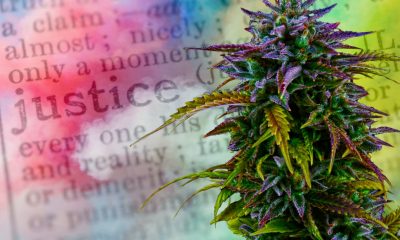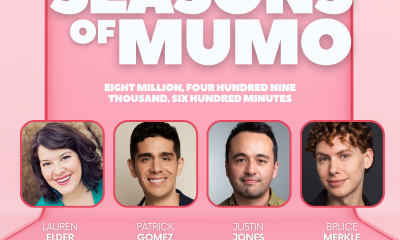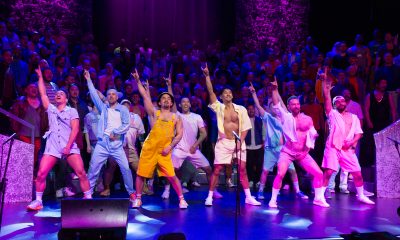Arts & Entertainment
Coronavirus claims iconic LGBTQ playwright Terrence McNally
The four-time Tony winner penned “Love! Valour! Compassion!” and the libretto for “Kiss of the Spider Woman.”
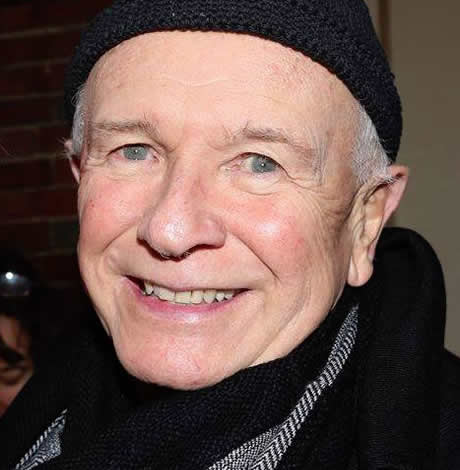
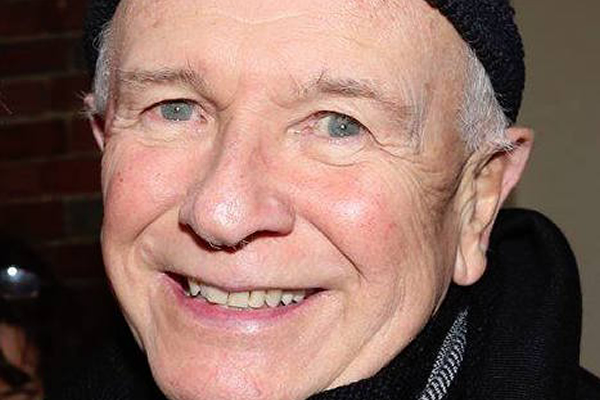
Terrence McNally (Photo by ReadingReed43 via Wikimedia Commons)
The theatre community, already hard hit by the coronavirus pandemic, has been dealt a painful blow with the news that Terrence McNally, the 4-time Tony winning playwright whose work portrayed a rich range of human emotional experience and broke barriers in its depiction of gay life, has succumbed to complications from COVID-19 at the age of 81.
McNally, who was a survivor of lung cancer and lived with chronic COPD, died on Tuesday at the Sarasota Memorial Hospital in Florida.
Born in St. Petersburg, Florida, McNally grew up in Corpus Christi, Texas, where his New York-born parents instilled in him a love for theatre from an early age. After earning a BA at Columbia University in 1960, he developed a relationship with author John Steinbeck, who hired the young playwright to accompany his family on a worldwide cruise as a tutor to his teenage sons. Steinbeck would later enlist McNally to write the libretto for “Here’s Where I Belong,” a musical stage adaptation of the author’s classic novel, “East of Eden.”
During his early years in New York, McNally also developed a relationship with fellow playwright Edward Albee, whom he met when the two shared a cab; the pair were essentially a couple for four years, during the period in which Albee wrote “The American Dream” and “Who’s Afraid of Virginia Woolf?,” two of his most important works. It was a romance that would cast a shadow over McNally’s early career, when some critics dismissed him as “the boyfriend” after the premiere of his Broadway debut, “And Things That Go Bump in the Night.” The play, which was McNally’s first effort in three acts, flopped due to poor initial reviews – attributed by author Boze Hadleigh in his book, “Who’s Afraid of Terrence McNally,” to homophobia from conservative New York critics – even after subsequent critical reaction and audience response proved to be more favorable.
After the failure of his initial foray onto the Broadway stage, McNally rebounded with an acclaimed one-act, “Next,” which featured James Coco as a middle-aged man mistakenly drafted into the army and was directed by Elaine May, and was presented Off-Broadway in a double bill with May’s “Adaptation” in 1967. Several other one-acts followed, and the playwright gained a reputation for tackling edgy subject matter with sharp social commentary, biting dialogue, and farcical situations. He also attracted early controversy for featuring onstage nudity (from actress Sally Kirkland) for the entire length of his kidnapping drama, “Sweet Eros.”
Success came his way in the seventies, when he racked up an Obie award for 1974’s “Bad Habits,” and a Broadway hit with “The Ritz,” a risqué farce set in a gay bathhouse where a straight middle-aged business man unwittingly goes into hiding to escape his wife’s murderous mafioso brother. Adapted from his own earlier play, “The Tubs,” it was subsequently turned into a 1976 film version (directed by “A Hard Day’s Night” filmmaker Richard Lester), starring original stage cast members Jack Weston, Jerry Stiller, F. Murray Abraham, and Rita Moreno (reprising her Tony-winning role as bathhouse chanteuse Googie Gomez), as well as featuring a blonde-dyed Treat Williams in an early appearance as an undercover cop.
After another series of career setbacks, McNally rebounded again in the eighties with more Off-Broadway acclaim for his play, “Frankie and Johnny in the Clair de Lune,” which starred Kathy Bates and F. Murray Abraham. The playwright has said that it was his first work after becoming sober, telling the New York Times in 2019, “There was certainly a change in my work. It’s hard to know who you are if you’re drunk all the time. It clouds your thinking. I started thinking more about my people — my characters.”
It was in the nineties, however, that McNally blossomed into a master playwright, with plays like “Lips Together, Teeth Apart,” which placed AIDS squarely in the backdrop of its story about two married couples spending a weekend on Fire Island, and “Master Class,” a tour-de-force one-woman show about Maria Callas which featured Zoe Caldwell in a widely acclaimed performance.
It was also during this period that McNally wrote “Love! Valour! Compassion!,” an expansive play about a group of gay friends who spend three successive holiday weekends over the course of a summer together at a lake house in upstate New York. Transferring to Broadway after a successful debut at the Manhattan Theatre Club – with which McNally had a long association, and where he developed several of his important works – in a production directed by Joe Mantello, it was a pastoral, introspective, Chekhovian drama that offered deeply-drawn, non-stereotypical portrayals of gay characters confronting the various issues in their lives and their relationships; it was also a snapshot of life at the height of the AIDS crisis, exploring the ways in which the spectre of the disease was an unavoidable part of day-to-day life that encroached upon every aspect of gay experience. McNally’s script, bolstered by the richly human performances of an ensemble cast that included Nathan Lane, John Glover, John Benjamin Hickey, Anthony Heald, and Justin Kirk, countered the potential for moroseness with warmth and humor, and the play is now widely seen, alongside plays such as Tony Kushner’s “Angels in America” and Paul Rudnick’s “Jeffrey,” as one of the most important theatrical works of the AIDS era. A film version in 1997 reunited most of the original stage cast, though the notably straight Jason Alexander replaced Lane in the role of Buzz, the most outwardly flamboyant of the play’s eight gay characters.
It was in the nineties when McNally also established himself as an important figure in the musical genre, contributing the libretto for John Kander and Fred Ebb’s “The Rink” (a short-lived musical drama starring Chita Rivera and Liza Minnelli) before going on to collaborate again with the legendary score composers on “Kiss of the Spider Woman,” their musical version of the Manuel Puig novel about the unlikely friendship that develops between a political revolutionary and a gay window dresser as they share a cell in a Mexican prison. The musical (which also starred Rivera) was a smash hit and won McNally his first Tony (Best Book for a Musical) in 1993.
In 1998, he won another Tony in the same category for the libretto of “Ragtime,” a widely-acclaimed musical adaptation of the E.L. Doctorow novel exploring racism against the backdrop of the turn of the 20th Century with a score by Stephen Flaherty and Lynne Ahrens.
His other two Tonys were for “Love! Valour! Compassion!” and “Master Class,” in 1995 and 1996, respectively.
In his later career, McNally courted controversy once again with “Corpus Christi,” a 1998 “passion play” that queered the biblical story of Jesus and the Apostles by reimagining them as gay men living in modern-day Texas. At the time, the production was met with protests (McNally himself received death threats), although reviewers found its content to be surprisingly uncontroversial, with Jason Zinoman of the New York Times calling it “earnest and reverent” and “more personal than political.”
Other notable dramatic works included “The Lisbon Traviata,” “It’s Only A Play,” “A Perfect Ganesh,” “The Stendahl Syndrome,” “Mothers and Sons,” and his last, 2018’s “Fire and Air.” He also wrote librettos for the musicals “The Full Monty,” “A Man of No Importance,” “Anastasia,” and “The Visit” (also with Kander and Ebb, and also starring Rivera), and for the operas “Dead Man Walking,” “Three Decembers,” and “Great Scott.”
He also wrote for television, including an Emmy-winning teleplay for the 1988 AIDS drama “Andre’s Mother.” For film, he wrote the screenplays for the film adaptations of his plays, “The Ritz,” “Love! Valour! Compassion!,” and “Frankie and Johnny at the Clair de Lune” (retitled as simply “Frankie and Johnny”).
Besides his Tony and Emmy wins, he also earned three Drama Desk Awards, two Lucille Lortel Awards, and two Obies, as well as a Pulitzer Prize nomination.
In addition to his four competitive Tonys, he was awarded a Special Tony Award for Lifetime Achievement in 2019.
He was also the recipient of two Guggenheim Fellowships and a Rockefeller Grant.
McNally is survived by his husband, Thomas Kirdahy, whom he wed in 2010 after a long relationship. Other survivors include a brother Peter McNally, and his wife Vicky McNally, along with their children and grandchildren; also listed among the survivors are Mother-in-Law Joan Kirdahy, sister/brother-in-laws Carol Kirdahy, Kevin Kirdahy, James Kirdahy, Kathleen Kirdahy Kay, and Neil Kirdahy.
Books
Richard E. Cytowic explores complicated relationship with father in new book
‘The Magician’s Accomplice’ touches on camp, ‘80s gay D.C., alcoholism
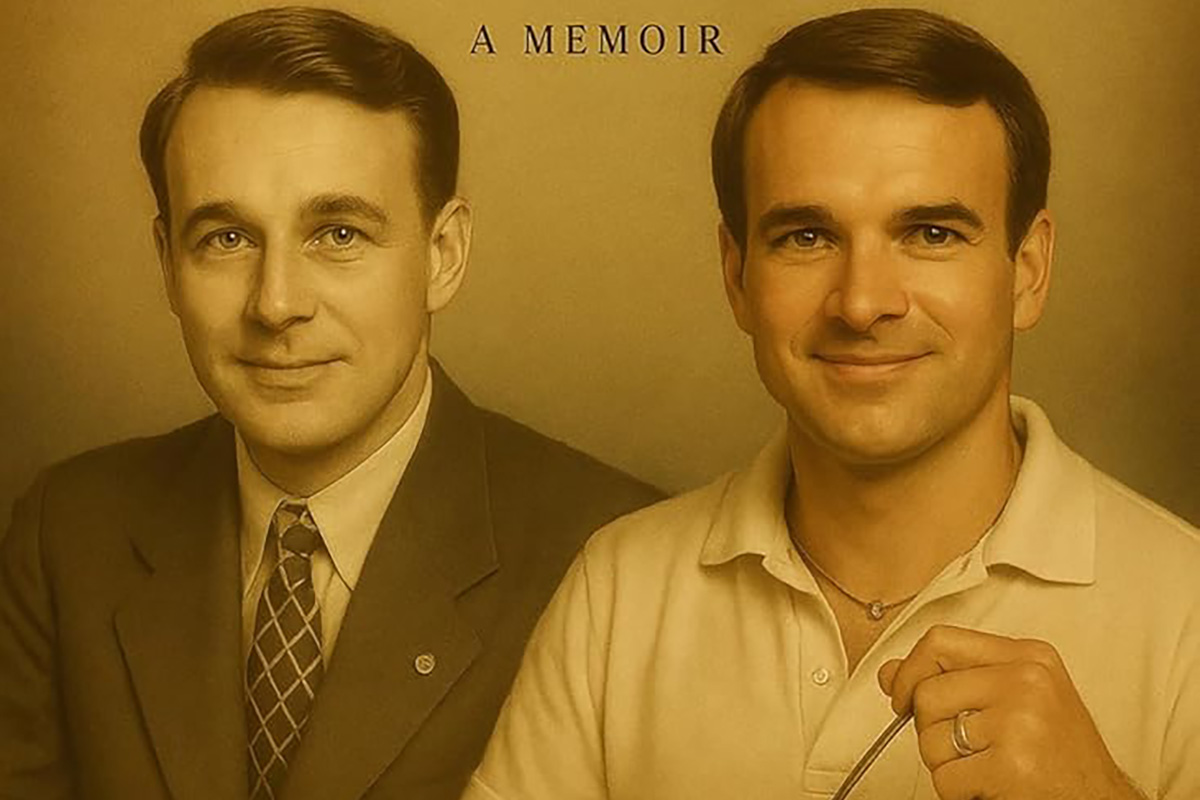
Richard E. Cytowic, neurology professor at George Washington University, has written a memoir, “The Magician’s Accomplice: My Father and I in the Age of Anxiety,” about his complicated relationship with his father, Edmund R. Cytowic. “Big Ed,” also a doctor, was a larger-than-life figure who molded his family into a perfect image while hiding his drinking and drug use. In an interview edited for clarity, Dr. Cytowic spoke about magic as metaphor, memories, and gay life in D.C.

BLADE: What was your inspiration for writing this memoir?
RICHARD CYTOWIC: It was something I felt I had to do. If I didn’t write it, I would go crazy. And it’s taken me about 10 years. It’s gone through many iterations. The first version started with my first day at Duke and had a dual narrative with myself as a young man, stumbling about making mistakes, and the older, wiser neurologist looking back on his younger self and commenting on it. That didn’t work out, but I realized the story was really about my father and me and our dynamic, how he shaped me to be just like him. At the time, I didn’t realize, because, when you’re too close to the material, you can’t see it for what it is. My sister’s observation in the memoir’s opening line, “Come hell or high water, you were going to be a doctor like him,” captures all my memories of him. And I am, I was.
BLADE: The interpretations you give some of your memories are striking. For instance, your family dancing onstage at a Liberace concert. From the outside it feels charming, yet there’s pain there.
CYTOWIC: It is an amusing anecdote. But it’s also sad because it shows we were all performers. We got up on stage effortlessly, we all knew our lines. We knew what to do, how to pose in front of 4,000 people, because we were Big Ed’s puppets for many years. And we just thought it was quite natural to perform because we had been doing this all our lives.
BLADE: It’s striking how in that moment you saw yourself becoming a monster like your father, trying to be the center of attention. You told Liberace, “I have a piece ready to play if you want.”
CYTOWIC: And he said, “This is my show, Richard.” He saw that even at 10 years old, I was trying to take over the center stage. But that’s what we were taught. We were supposed to shine and perform and just be charming, in a way that made us totally false. My impetus for this memoir was to try to understand Big Ed. For stories like this where you have an alcoholic father out of control, it’s so easy for everybody to say, “Oh, my God, I hate him, I can’t stand him.” What I call “You son of a bitch, look what you did to me” stories, those are the easiest stories in the world to tell. But it doesn’t tell anything about the monster, so you have to ask: Was the monster hurt or lonely? Why did he act that way? What made him the way he was? Was there some original wound that he was acting out on himself? So, in the end, instead of a “You son of a bitch” story, it’s really a love story to Big Ed, trying to show some compassion to him and understanding what sort of creature he was.
BLADE: At one point you describe him as high camp. I wonder if you if you ever thought that he might have been gay or bisexual, if deeply closeted?
CYTOWIC: I wonder that too. I don’t have any proof one way or the other, but he certainly was sexually very outspoken. He had all those nude orgy parties and took pictures all the time. I’m sure that goes on all the time now in D.C., but back then, it must have been very unusual. The fact that he could convince people to take part in all that, have them dress up in costumes and pose for pictures, you just have to laugh and think, wow, what a force of nature he was. And mentioning camp, he was camp in the sense of Susan Sontag’s definition, which is a singular incandescent figure who is one thing, an exaggeration, and that was him. He instilled in me a taste for the offbeat and the unusual. If something was normal, I wasn’t interested, but if it was a little off, that was attractive.
BLADE: You mention being drawn to camp figures like Auntie Mame and Liberace.
CYTOWIC: When I saw “Auntie Mame” at Radio City Music Hall, I was in the first grade, so I was five years old. I loved that movie so much because all that craziness was so familiar. Patrick making drinks in the morning, I did that. And my classmates and peers didn’t do anything like that, though it took a while to realize what an unusual life we were living, my mother, sister, and I with Big Ed.
BLADE: The theme of magic and magic tricks runs through the book, which connects so much of life with your father and even your life outside.
CYTOWIC: Magic is a real through line, because two things were prominent with Big Ed. One was the cameras. He had tons of cameras, and the other was the magic, which he did constantly. So would I. When we went to the lake in the summer, I would entertain neighbors and guests by putting on a big magic show. I even made up my own trick. As I say, magic is about telling people you’re going to fool them and then fooling them. Having them know what they’re seeing isn’t possible, and yet they believe it.
BLADE: It feels like such a perfect metaphor for your family.
CYTOWIC: It’s the spectator’s ability to hold two different, contradictory perspectives at the same time. That’s what we did. On the outside, we were a lovely family, everybody would compliment us when we went out to dinner. Back then, with children in restaurants, everybody said, “Oh my god, they’re going to start screaming and running around,” and we were the opposite. My sister and I were dressed up, I had a little coat and clip-on tie. We cleaned our plates, which my father really liked. And then people would come over and compliment my parents on what lovely children they had. Even the proprietor would say, “Doc, your kids are welcome here anytime.” We went against expectations. Here’s this picture perfect little family, so sweet and lovable, and yet behind the scenes, it was absolute chaos. That was the magic, the illusion that we were this lovely family on the surface, while behind the scenes, all hell was breaking loose.
My sister to this day still hates my father. Every time we talk about him, she says, “I hated him. I couldn’t get out of the house fast enough.” She’s frozen in her perspective, and I went instead and looked, to find out who he was, what made him kick? Why was he this way? How did he make me the way I am? And how did I emerge with my own personality? Also, in turning away from the “You son of a bitch” kind of approach and moving to one of trying to understand him, that’s the magic trick that that brings him back, like the dove that’s hidden, and then you produce some silk scarves and, abracadabra, the dove reappears again, all whole.
BLADE: Your descriptions of gay life in D.C. during the ‘80s are fascinating. What’s been the biggest change in that world nowadays?
CYTOWIC: When I came to D.C., you really couldn’t be out in a broad sort of way. So you cultivated a circle of friends, you learned to entertain and throw parties, you did fabulous things. There was a lot more cohesiveness in this world because we all protected one another. I was out but I didn’t make a big deal of it. And it was only when I interviewed for the position of chief resident of Neurology at GW, that it became well-known. I kept meeting people through the process, including David, a psychiatrist who was training to get his neurology certification. I went to his place and talked some more and felt so comfortable talking to him. He mentioned he and the woman he was seeing were going out that night and asked, “You want me to get a date for you?” I said, “Well, David, that’s very nice. Thank you, but I’m gay.” I didn’t realize that he would tell everybody so that when I finally accepted the job and showed up, everybody knew already that I was gay. It helped that there was a physician, an assistant Dean, in the department who was also gay. So we were naturally sympathetic to one another and he was very helpful. It really helped, too, that GW was, and still is, the gayest medical school in the country. If a student at another medical school had problems because he was gay, being bullied, he would transfer to GW. It became a magnet for medical students all over the country. Also, I remember thinking, I’m six blocks from the White House. It doesn’t get any better. At that time, D.C. was a very gay city, so it was easy to make friends and pick up tricks or whatever I wanted to do.
The cell phone has ruined so much because you can’t get people to commit to anything. Instead of saying, “Let’s have dinner next Tuesday at 7:30,” they say, “Well, I don’t know what I might be doing. Something better might come along.” I don’t how people socialize anymore because it’s all so last minute. It drives me crazy. I used to throw sex parties in the ‘90s. I called them “office parties” because they were in my office. I took over from a group that socialized first, starting with drinks and hors d’oeuvres, and then they announced, “time to take off your clothes.” And I said, “No, you cannot mix a social setting with a sexual setting. It doesn’t work like that.” I took over, and set strict rules, one being, everybody arrives at the same time. You’ve got to be here between 8 and 8:15, or else the door is locked, and you’re not getting in. Because so many other parties had people showing up two hours after it started, when things got hot. If you make things hot from the get go, then everybody has a really good time. Now, I don’t know what people do. I’m out of the loop. My orgy days are over.
BLADE: What do you hope readers will take away from “The Magician’s Accomplice?”
CYTOWIC: How to be yourself. I learned how to be myself and not be at the mercy of other people’s expectations. I developed the attitude of, I don’t care what other people think, because their opinion doesn’t affect me one way or the other. So when I write something, I’m not trying to prove a point or convince people. I say, “Here’s what I know. Here’s what I’ve been through. Take a look if you find it useful.” Maybe my experiences will help you.
The Blade may receive commissions from qualifying purchases made via this post.
a&e features
Jennifer Tilly on the legacy of queer neo-noir ‘Bound’ nearly 30 years later: “It was considered detrimental to your career to play a lesbian character”
Tilly also recalls the AIDS epidemic and Project Angel Food’s crucial work.
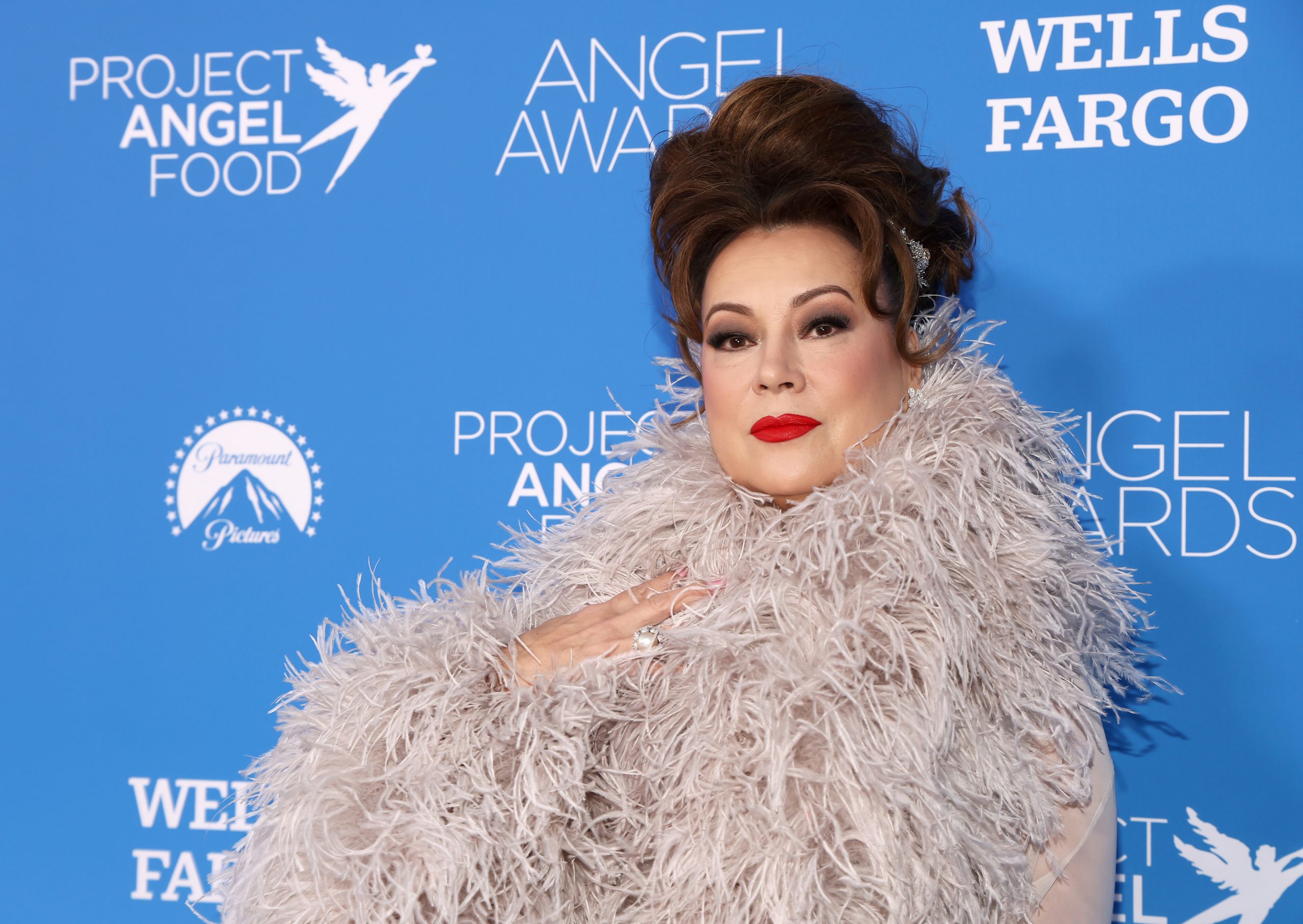
Before accepting the top honor at this year’s Project Angel Food’s Angel Awards, Oscar-nominated and GLAAD award-winning actor Jennifer Tilly (Bullets Over Broadway) reflected on the lasting influence of the 1996 queer neo-noir Bound, which she starred in alongside Gina Gershon (Showgirls).
“When we went in, they said to us, ‘You will not believe the actresses who refused to come in and read’ because it was considered detrimental to your career to play a lesbian character,” Tilly told The Blade on the Sept. 27 red carpet at Paramount Studios in Los Angeles. “But I was astonished because I thought, ‘This is the best script that I’ve read in such a long time with one of the best roles for women.’”
Tilly and Gershon co-starred as two women who fall in love and concoct a scheme to steal millions of dollars in mob money, and the film was directed by the Wachowski Sisters before they became household names. “They were first-time directors — nobody knew anything about them,” Tilly said. “But it’s one of my favorite performances of all time, and I’m really happy the new generation is beginning to discover it. It’s been on a lot of lists of the best film noir, the best lesbian movies.”
The Wachowskis came out as trans decades later, in 2012 and 2016, respectively. While Tilly recalls being surprised, when she reflects on her time working with them, she claims she should’ve known: “They wrote two of the most brilliant parts for women that I’ve ever read. So they had that soul, that heart and sensibility. And then after they did The Matrix and became global superstars. They’re so talented, and I’m always happy to see films that they have created.”
Tilly being recognized with the Angel Award is a full-circle moment, as she has been a supporter of the L.A.-based organization since the ‘90s. Past recipients include Elizabeth Taylor, Sharon Stone, and Jamie Lee Curtis, just to name a few.
“I was just so touched and honored and thrilled because I have been working with them for over 30 years, but I never really thought that I would get an award like this because there are so many people that work for them,” Tilly said. “They have a lot of support from the celebrity community.”
When Project Angel Food was founded in 1989 by Marianne Williamson, the organization started out delivering food to people affected by HIV/AIDS. Tilly recalls that time in the world and the impact the charity made.
“I mean, we were all losing friends. People didn’t understand a lot about AIDS, so people afflicted with the disease were a little bit pariahs because people were afraid,” Tilly said. “So the idea of having a charity that delivers food to these people who are housebound — they’re not only delivering nourishment or physical sustenance, they’re also delivering emotional sustenance. Because for some of these people, the food delivery people are maybe the only people they see all week.”
Arts & Entertainment
New exhibition unveils archival records and forgotten stories of HIV/AIDS activists
“The Sky is Always Falling” intertwines past and present cycles of queer crises and fights for freedom
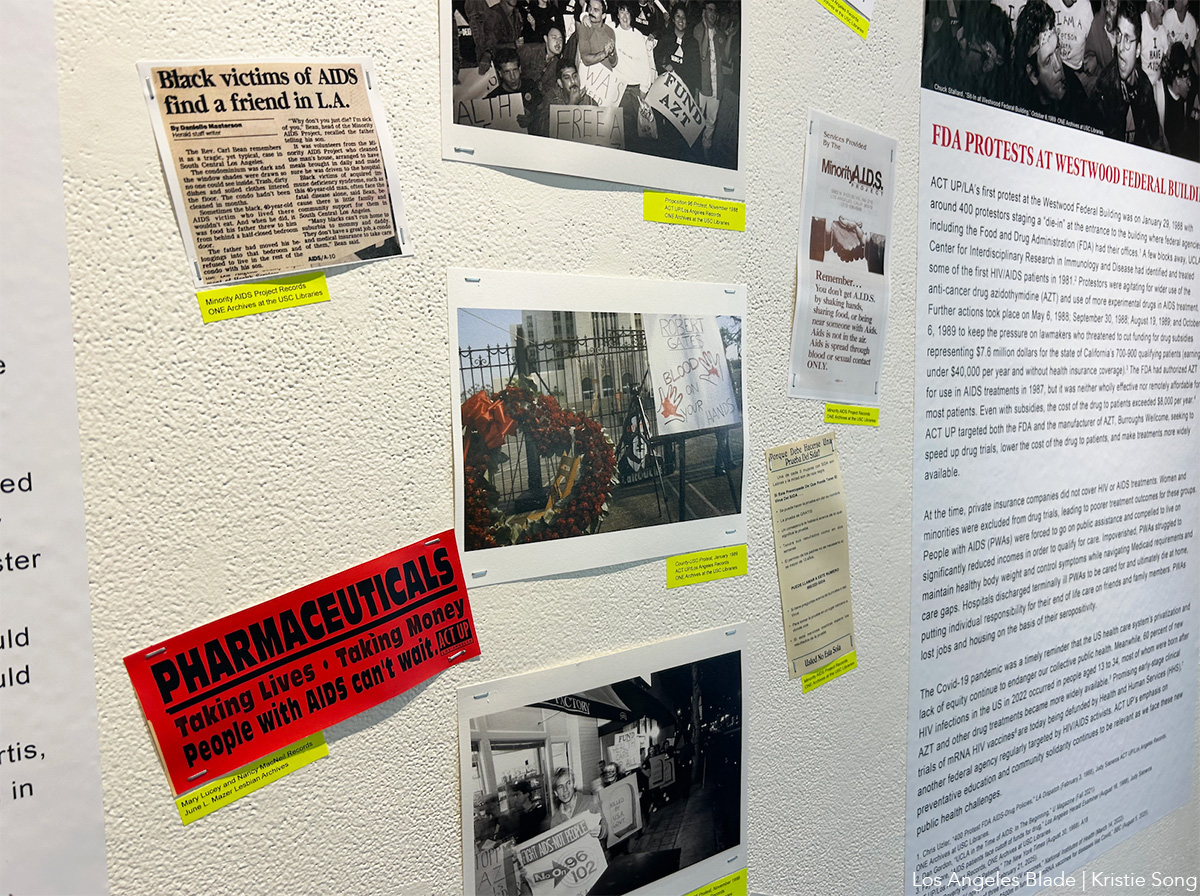
On Wednesday afternoon, art critic and curator Anuradha Vikram strode across the wide main room of the Advocate and Gochis Galleries at the Los Angeles LGBT Center, pressing neon labels onto walls covered with newspaper clippings, pamphlet pages, protest photos and flyer printouts from the peak of the national AIDS epidemic that began in the early 1980s.
These documents hold fragments of the lives of artists, activists and supporters of the AIDS Coalition To Unleash Power/Los Angeles (ACT UP/LA), a group that organized various non-violent protests, community meetings, vigils and other demonstrations to bring attention to harmful and ineffective government policies around HIV/AIDS; advocate for better healthcare access, hospital conditions and resources for PWAs (people with AIDS); and shine light on communities who were sidelined in HIV/AIDS research and care, including women, incarcerated people, and communities of color.
“The Sky is Always Falling: HIV/AIDS Activists Unleashing Power in Los Angeles Then and Now” is a new exhibition opening on September 28th that preserves tangible records of ACT UP/LA’s existence and resistance. Much of the media included in this show is a remnant from when the group was active, from its formation in 1987 to its eventual disintegration in the late 1990s. The various pieces on display are reproductions of historical files and records collected and preserved at institutions like the ONE Archives and the June L. Mazer Lesbian Archives, two major repositories for LGBTQ+ historical materials.
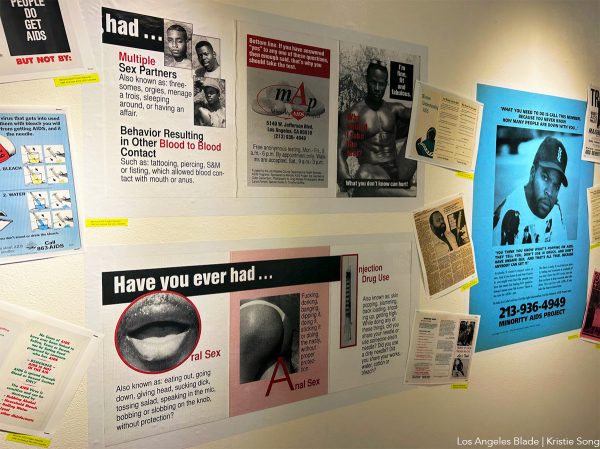
“Since this is primarily focused on the 1980s and ‘90s, so much of the material was printouts, faxes, photocopies, and computer graphic design setups. Reproducing it all made material sense,” Vikram told the Blade.
“If this was a show about the 1940’s or the 1890’s, it might not feel so authentic to have copies of things. But here, even the original materials were copies at one time, so they’re the copies that survived. We’re working with the idea of the copy being the original — which is a very 90’s kind of zine, community-organizing approach that also then applies here for ACT/UP.”
Since April, Vikram has been planning, researching and organizing the exhibition as part of the local Circa: Queer Histories Festival. Now in its third year, Circa was created by One Institute, a long-standing LGBTQ+ organization that amplifies queer histories through educational programming. Their festival runs through October 31st, and includes a panel on the history of sex work in NYC ballroom culture, a South Asian dance and drag performance, a workshop on trans history and reclaiming origin stories, a screening of 1972 Japanese “pink film” Shinjuku Midnight Story: Man and Woman, and several other lectures, readings, and gatherings.
“The Sky is Always Falling” is the opening event of Circa’s packed calendar this year, and offers attendees a chance to become part of an intergenerational conversation around queer solidarity in the face of public health, social, and political crises. The show highlights key actions organized by ACT UP/LA members, including a 1990 protest at Frontera women’s prison that was organized by the coalition’s Women’s Caucus. Over a hundred supporters protested the prison’s handling of its AIDS ward, criticizing its lack of proper nutrition, care, and qualified staff.
In June of 2020, an urgent memo was released by public health experts, stating that San Quentin California State Prison was being impacted by a rapidly developing COVID-19 outbreak and had “profoundly inadequate resources to keep it from developing into a full-blown local epidemic.”
Vikram says it is important to highlight how systemic issues and failures create cycles of violence for marginalized populations. “These issues haven’t gone away in any way. They’ve just kind of rolled forward,” Vikram said. “In each of these topics and panels, the goal was to connect it, ultimately, to something today. So you would understand that it’s not just a historical phenomenon, but rather like a guide, a little bit of a roadmap for how to deal with stuff now.”
A self-proclaimed “baby teenager” during the height of ACT UP activations, Vikram is grateful to the queer elders who welcomed her into their spaces and shared their stories with her. These connections informed her own journey as a queer South Asian person growing up in New York, carving out a space for her own voice and identity in contemporary art criticism and curating.
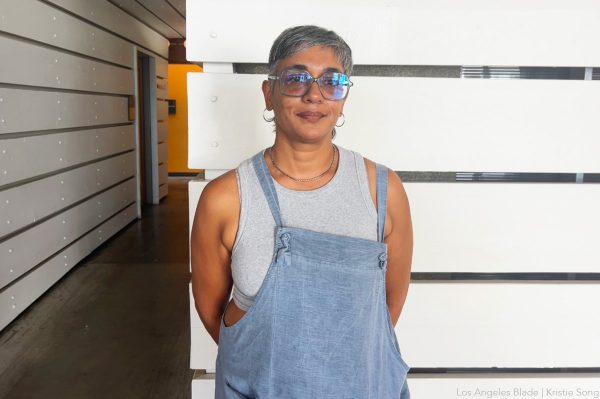
Vikram hopes that — through this exhibition, her lecturing, and her community work — she can “repair” ties between queer adolescents today and queer people of older generations. The knowledge, guidance, and joy she received from relationships she formed with older queer people in her youth provided a model with which she could navigate the world: with fervor and with bravery.
“Now I feel that young people really have very little connection to elder generations — even middle generations like mine. And so that knowledge is not being continuously passed on in the same way,” Vikram said. “This is actually what anthropologists say makes us human: the ability to have that intergenerational transfer of knowledge without having to fight the same battles every generation. And, at this moment in time, that’s being severed because of the fascist turn in our culture, really. So the goal of this project was to help young people who are trying now to organize around a number of issues against this government — for gay rights, for trans rights, for Palestine, for their own health and welfare — to help them get that information in some form.”
“The Sky is Always Falling” opens on Sunday, September 28th with a reception from 4-7 p.m. at the Advocate and Gochis Galleries at the Los Angeles LBGT Center.
Arts & Entertainment
Pride Under the Pines in Idyllwild continues for its 5th year, despite social media backlash
Pride Under the Pines, founded by couple Jeremy Taylor and Niels Kosman, continues on October 4th with live performances, drag, activism, and fellowship
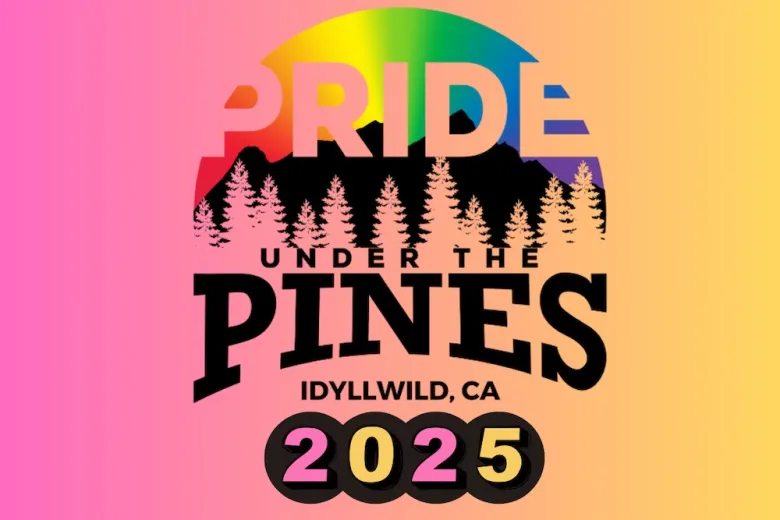
Within Riverside County, in the San Jacinto Mountains, lies the charming community of Idyllwild, known for its beautiful scenery, artistic vibe, and recreational activities. Located just an hour from Palm Springs, it also boasts a growing LGBTQ contingency.
Idyllwild captured the hearts of couple Jeremy Taylor and Niels Kosman, the owners of PS Homeboys, one of Palm Springs’ top interior design and art boutiques. Frequent visitors to Idyllwild, Taylor and Kosman began to wonder why the town never held its own Pride. Taking matters into their own hands and partnering with business owners in the city, Pride Under the Pines debuted on October 23rd, 2021, with over 800 attendees.
Not only was the event a success in terms of LGBTQ representation for the community, but local businesses reported a boom in sales and customers. Pride Under the Pines has since become one of the most anticipated Idyllwild events of the year.
This year, the event celebrates its 5th year with a bang, turning up the glam. The day’s festivities will feature headliners Janice Robinson (“Dreamer”, “There Must Be Love”) and West Hollywood’s Prince Joshua, go-go studs, DJ Galaxy (courtesy of KGay), Congressman Candidate Brandon Riker, and community health partners, with a drag line-up that includes Mayhem Miller, Violeta, and Abigail Beverly Hillz. Los Angeles Blade publisher Alexander Rodriguez will serve as the day’s emcee.
This year continues ahead, full force, despite social media backlash for the event’s signage, hanging smack dab in the center of town. Pride Under the Pines founders Taylor and Kosman are unwavering in their mission to bring queer representation to “The Hill.” They chatted with us as they put the final touches on next week’s programming.
What was the inspiration behind creating Pride Under the Pines?
We wanted to create something truly grassroots and community-driven—a Pride that felt intimate, authentic, and rooted in love. Idyllwild is a magical mountain town that has always embraced diversity, and we thought it was the perfect setting to bring people together in celebration of LGBTQ+ pride, visibility, and joy. We were the first Pride Festival since the pandemic, and it all started when we used Idyllwild as our lockdown escape. We fell in love with the town and its community. Through conversations, we learned there is a large LGBTQ community that also feels the need to be heard and seen. This Pride was started to shine a bright light on the local queer community and to bring awareness to everyone else.
What makes Pride Under the Pines different than other Prides?
Unlike many large-scale city Prides, this event has an intimate, small-town charm. You’re surrounded by nature, pine trees, and a community that genuinely rallies together. It’s not about corporate floats—it’s about neighbors, friends, and allies lifting each other up. That balance of heart, inclusivity, and stunning mountain setting makes it truly one-of-a-kind.
What is your mission in producing Pride Under the Pines?
Our mission is to create a safe, joyful, and visible space where the LGBTQ+ community and our allies can come together. We want to celebrate diversity, promote equality, and strengthen connections in a way that uplifts both the queer community and the town of Idyllwild.
What have been some of your biggest challenges in establishing this event over the years?
Permitting, logistics, and funding have always been challenges for grassroots organizers like us. Each year, we navigate county regulations, rising costs, and unexpected hurdles. And of course, building something from scratch in a small town takes time and persistence. But the love we receive from attendees makes every obstacle worth it.
What have you loved most about working on this project?
The connections. Seeing people who’ve never been to Idyllwild fall in love with the town. Watching LGBTQ+ youth feel seen. Hearing allies say this is their favorite event of the year. And, most of all, the joy of building something meaningful together as a couple, a team, and a community.
What can we expect from this year?
Our 5th anniversary is the biggest yet! A brand-new location at the Idyllwild Town Hall, incredible headliners like Janice Robinson, fabulous drag performances, DJs, live music, a beer garden, delicious food, and a VIP experience with open bar and meet-and-greets. It’s going to feel like a full festival while still keeping that warm community spirit.
Your sign is in the middle of town. Why is it so important to grow visibility in today’s climate?
Visibility saves lives. At a time when LGBTQ+ rights are under attack nationwide, putting a Pride banner in the center of town says: We are here, we are proud, and we are part of this community. It’s a statement of resilience and hope—for queer people in Idyllwild, for visitors, and for anyone driving by who needs to feel seen.
You have received hateful social media comments. How does that make you feel? What is your first reaction?
Of course, it stings—but more than anything, it strengthens our resolve. Hate is loud, but love is louder. Our first reaction is to lean on our allies, our friends, and the outpouring of positivity that always follows.
Did you ever consider cancelling Pride because of hateful comments? What makes you continue to put it on?
Never. If anything, the hate shows exactly why this Pride is needed. We continue because the LGBTQ+ community deserves visibility, joy, and safety in every town—not just the big cities. We continue because love is stronger than hate.
What do you want to say to those who want you to shut down Pride Under the Pines?
We’d say this: Pride isn’t about you. It’s about love, equality, and visibility for people who have historically been silenced. No amount of hate will stop us from celebrating who we are.
On a fun note, how did you two meet, and how long have you been together?
We met years ago in Palm Springs—two creatives who bonded over design, humor, and a shared love for community. We’ve been together for over a decade, and every year just gets better.
You also own and run your business together. How do you maintain a healthy relationship while working so hard together and putting on events?
We laugh. A lot. We balance each other’s strengths and give each other space when needed. We’ve learned how to divide and conquer, but also when to come together. At the end of the day, we love what we do and we love each other—that makes even the hard days easier. We say if you can run a business together and produce a Gay Pride for 5 consecutive years, we must be doing something right.
What do you love most about the queer community in the Coachella Valley?
The diversity and resilience. Our community here is vibrant, creative, and unapologetically itself. Whether in Palm Springs, Idyllwild, or beyond, there’s a sense of family that’s deeply inspiring. We all support each other, whether we patronize each other’s business or we lift each other up through conversation and showing up. It is truly an amazing feeling, that sometimes we feel people forget to remember.
What is your message to the community?
Stand proud, stand visible, and stand together. We need each other more than ever. Come to the mountains, celebrate with us, and remember that Pride isn’t just a party—it’s a powerful act of love, resilience, and community.
The event will be held at Idyllwild Townhall / 25925 Cedar St, Idyllwild-Pine Cove, CA 92549
Theater
‘Just Another Day’ brings two veteran actors together for a bittersweet reflection on life: Theatre Review
Patty McCormack (The Bad Seed) and Dan Lauria (The Wonder Years) co-star in a delicate two-hander
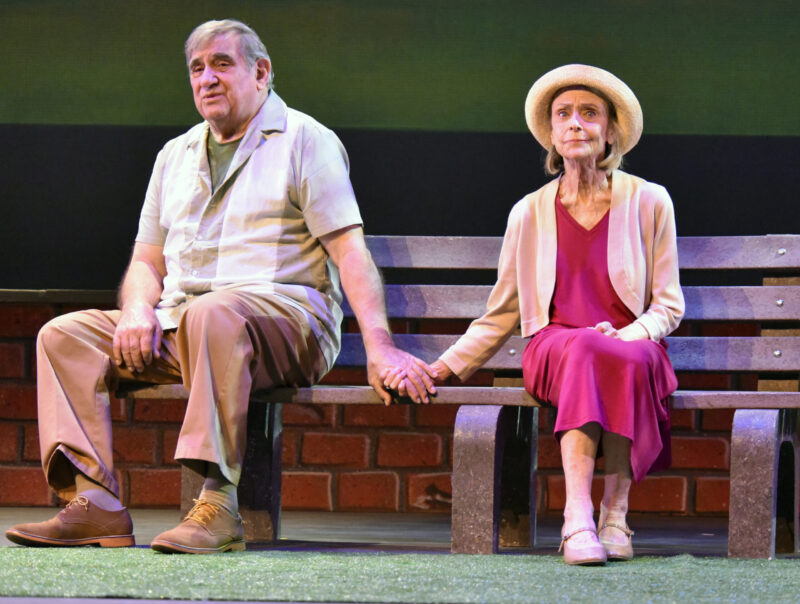
Just Another Day, the new play directed by Eric Krebs and written by Dan Lauria, revolves around a conversation (split into two separate days, two separate acts) between an unnamed older man and woman. It’s a simple set-up, the two sitting on a bench surrounded by open grass and skies, but the conversations they have about life, regrets, and their favorite classic movies reveal deeper layers to this heartwarming story. The play has found an intimate home at The Odyssey Theatre in Los Angeles.
The most emotional part of this narrative, revealed naturally through Lauria’s smart dialogue, is that the comedy writer (played by Lauria, known for The Wonder Years) and highbrow poet (played by Patty McCormack, Oscar-nominated for The Bad Seed) arrive at the bench every day not knowing their identities, or who they are to each other. So when the two reminisce on the dialogue of His Girl Friday and the charm of yesteryear, there’s a bitter irony to the proceedings: the two can vividly remember quotes from old movies, but don’t know the first thing about themselves because of memory issues.
Lauria’s dialogue creates contrast in the way our two leads speak, with Lauria’s talk being much more ordinary and slapstick, while McCormack leads with sophistication and carefully chosen words. Yet the two connect because of their differences; as they try to piece together who they might’ve been to each other in decades past, they form new memories that will certainly guide them through the uncertain present.
While the play is largely a two-hander (minus a humorous offscreen bellringer), both Lauria and McCormack get individual moments to shine in standout monologues, and each character finds themselves going through similar cycles of emotion. Just Another Day is certainly a more muted character study, but Lauria and McCormack consistently bring energy to the stage throughout the 95-minute runtime, especially in a few moments where the two run off the bench, shouting in harmony. A few moments where the two leads interact with the audience while recreating old acts can feel gimmicky and tired, but Lauria’s writing knows not to linger in any one place too long.
The park setting and natural lighting are simple, and all the better for it, but the end of the second act uses a spotlight and more intimate lighting to spark emotion for the audience. While the play does start to go in circles by the end — by design, it’s kind of inevitable — the note that it ends on is appropriately bittersweet.
The casting choices and themes at hand may position Just Another Day as a play for an older demographic, but it’s also the type of story that can connect multiple generations. More than just a nostalgia piece, Krebs and Lauria create a present-day love story with plenty of chemistry to enjoy. This may not be a must-see play, but it’s always nice to be reminded of the power of two veteran actors who haven’t lost a beat.
Just Another Day runs for one last weekend, through September 28th at The Odyssey
Movies
Closeted cop struggles with an undercover life in ‘Plainclothes’
A mid-1990s tale of mall cruising with a twist
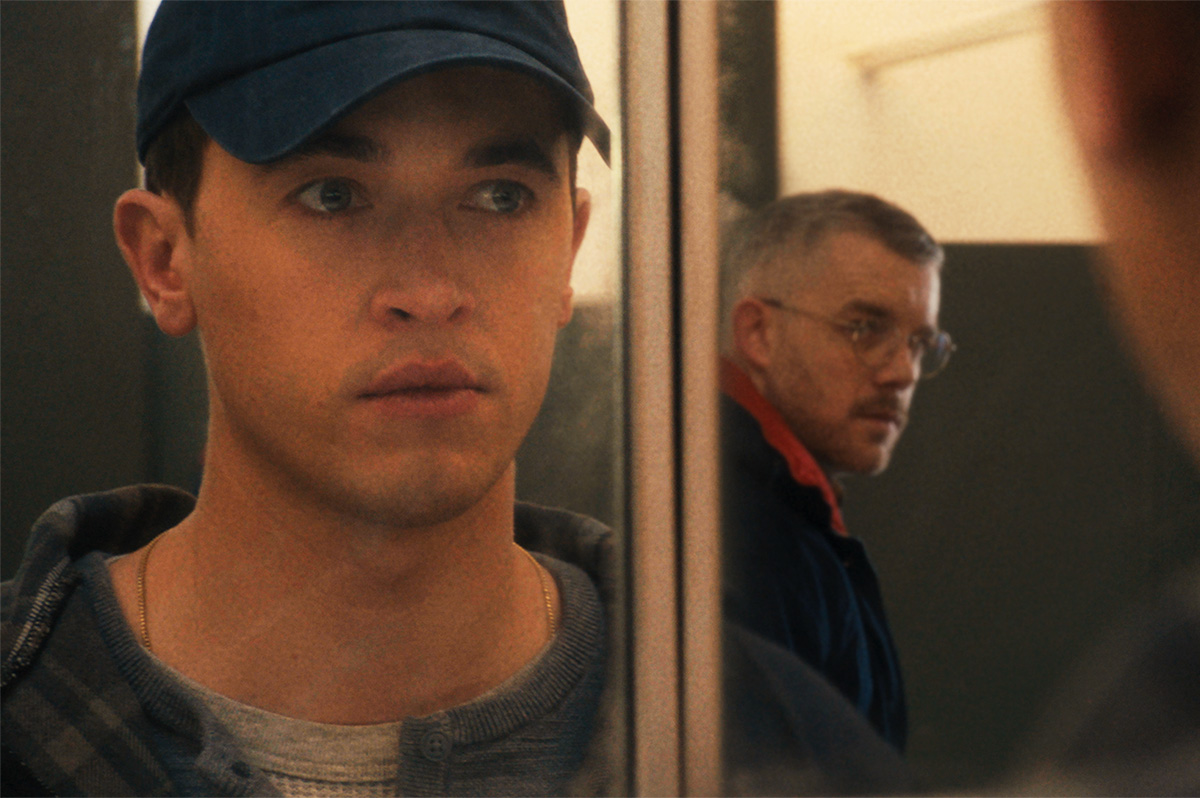
Once upon a time, before there were cell phone apps, gay men looking for a quick hook-up had to go out and find it in person.
Obviously, there are many of us still around who remember those days clearly enough (and frequently with a considerable degree of fondness), but generations who came of age after the advent of Grindr may not have a full enough picture of what it was like to understand the thrill of it – or the risk involved if you happened to get caught.
No matter which generational demographic you’re in, if you’re a gay man who has indulged in or even fantasized about “cruising” in a public space you will likely be drawn to “Plainclothes,” a Sundance Award-winning film from first-time director Carmen Emmi that opened in limited cities on Sept. 19 and expands for a wider release this weekend. Set in Syracuse of the mid-1990s, it offers a palpably personal – and uniquely double-sided – glimpse into the culture of anonymous gay sex that existed in that era, as well as the nerve-wracking tightrope of maintaining the semblance of “straightness” for our own safety despite the conflicts it ignites within our very nature.
That dual perspective comes because the film is centered on Lucas (Tom Blyth), a promising young police officer who has been assigned to work undercover in an ongoing “sting” operation targeting gay men at the local mall, using his good looks and “rough trade” charm to lure suspected cruisers into the men’s room and entrap them for public indecency. There’s just one problem: Lucas is gay himself, meticulously closeted both in his career and around his large working class family, and it’s becoming harder for him to dissociate himself from the persecution he’s helping to inflict against other guys just like him.
Things come to a breaking point when he finds himself attracted to one of his would-be targets, a distinguished-looking older “daddy” named Andrew (Russell Tovey) with a confident swagger that feels like a force of nature, and purposely fumbles the sting to protect him – but not before getting those all-important digits for a later connection. A clandestine romance begins, though Andrew has a double life of his own to maintain, and Lucas, weary from the ever-exhausting effort of keeping his true self hidden, finds himself increasingly at odds with the hypocrisy of his work. Adding an even greater urgency to the situation, a misplaced letter puts his secrets at risk, forcing him to face the very real possibility of being exposed as gay to everyone he knows.
Marked with a distinctly authentic feel for both the social environment around queerness and the particulars of cruising culture in its pre-millennial setting, “Plainclothes” avoids the pitfalls of pushing an agenda and the tropes of victimhood that often mar such stories about living in the closet, largely due to an unvarnished frankness that comes with the expression of lived experience. There’s an observational neutrality about it that lifts it out of the trenches of culture-war politics and frames its narrative as something personal, the story of one among the many rather than an invocation of shared political grievance.
This refreshing freedom from pointedly overt cultural messaging stems largely from the fact that, while it is not strictly autobiographical, “Plainclothes” is woven from the personal history of its filmmaker. As writer/director Emmi explains in the movie’s press notes, he was inspired to make it when his brother was becoming a police officer in 2016, and he learned of sting operations against gay men that were still being conducted, conjuring his own memories of what it was like to be newly out in the ‘90s, when the public stigma of being gay was still amplified by the AIDS crisis and police persecution – especially in smaller-town settings like his native Syracuse – was a constant worry.
“To process these feelings, I found myself reflecting on my childhood in Syracuse, NY, in the ’90s,” he says. “I remembered deepening my voice, lying about my favorite music and movies to appear more ‘masculine’ – more ‘straight.’ I realized that, shaped by societal expectations of what a man should be, I ‘policed’ my feelings and became my own harshest enforcer.”
He goes on to say, “Writing this story for my hometown was something I had to do. I wanted to honor the place that raised me, even if I hadn’t always felt I belonged. Revisiting key locations — my childhood mall, the Landmark Theater, the greenhouses where my grandfather taught me to pot flowers — felt essential.”
It’s that essential feeling that lends his movie the sense of in-person realness that eludes many such films; by making something that feels like a memoir, infused with emotional intimacy rather than deliberate messaging. He gives us the story of an individual trapped in the conflict between personal identity and professional responsibility, whose struggle to emerge expresses an individual truth without conflating it into a larger battle for acceptance, and that makes it seem all the more universal, a coming-out story we can all relate to in our own way, even if our own coming-out looked nothing like it.
Of course, it would not be as effective as it is were it not for Blyth’s performance in the lead role; convincingly embodying the smoothly nonchalant feigned “machismo” of his blue-collar cop persona while also navigating the inner awakening that’s sparked by his world-changing encounter in the men’s room at the mall, he carries the film squarely on his shoulders and delivers it with full conviction. As for Tovey, who seems to have embraced the full-on “daddy” status that comes with his maturity, his Andrew is an enigma that peels slowly away as his own secrets come to light, and his chemistry with Blyth – with whom all of his scenes are shared – is both smouldering and tender. It should be mentioned that his role is more of a supporting turn, and that he has far less screen time than might be expected from his prominence in the film’s publicity campaign – but the presence he brings to it looms large enough to be tangible throughout the entire thing.
Coming at a time of dire uncertainty for queer existence in America, “Plainclothes” is certainly a film that’s aware of the importance of delivering queer narratives that both honor our humanity and remind us of what it’s like when we have to live in a world that requires us to disguise ourselves.
Thanks to Emmi’s focus on his own experiences of learning to navigate gayness in America, it succeeds with refreshing humility in achieving both objectives. It’s a small film, and one that feels even more intimate than its smallness might suggest, but that’s part of its winning strength. Better yet, although it doesn’t offer some unrealistic “happy ending” scenario or smooth over the pain and genuine risk of coming out in an environment where it doesn’t feel safe to do so, it leaves us with a feeling of relief, and a sense that things are always better when you don’t have to live your life undercover.
a&e features
The documentary ‘Dear Viv’ tells the story of a Queen and her community
The Vivienne’s Drag Race sisters speak about her legacy and the impact of drug abuse on the LGBTQ+ community
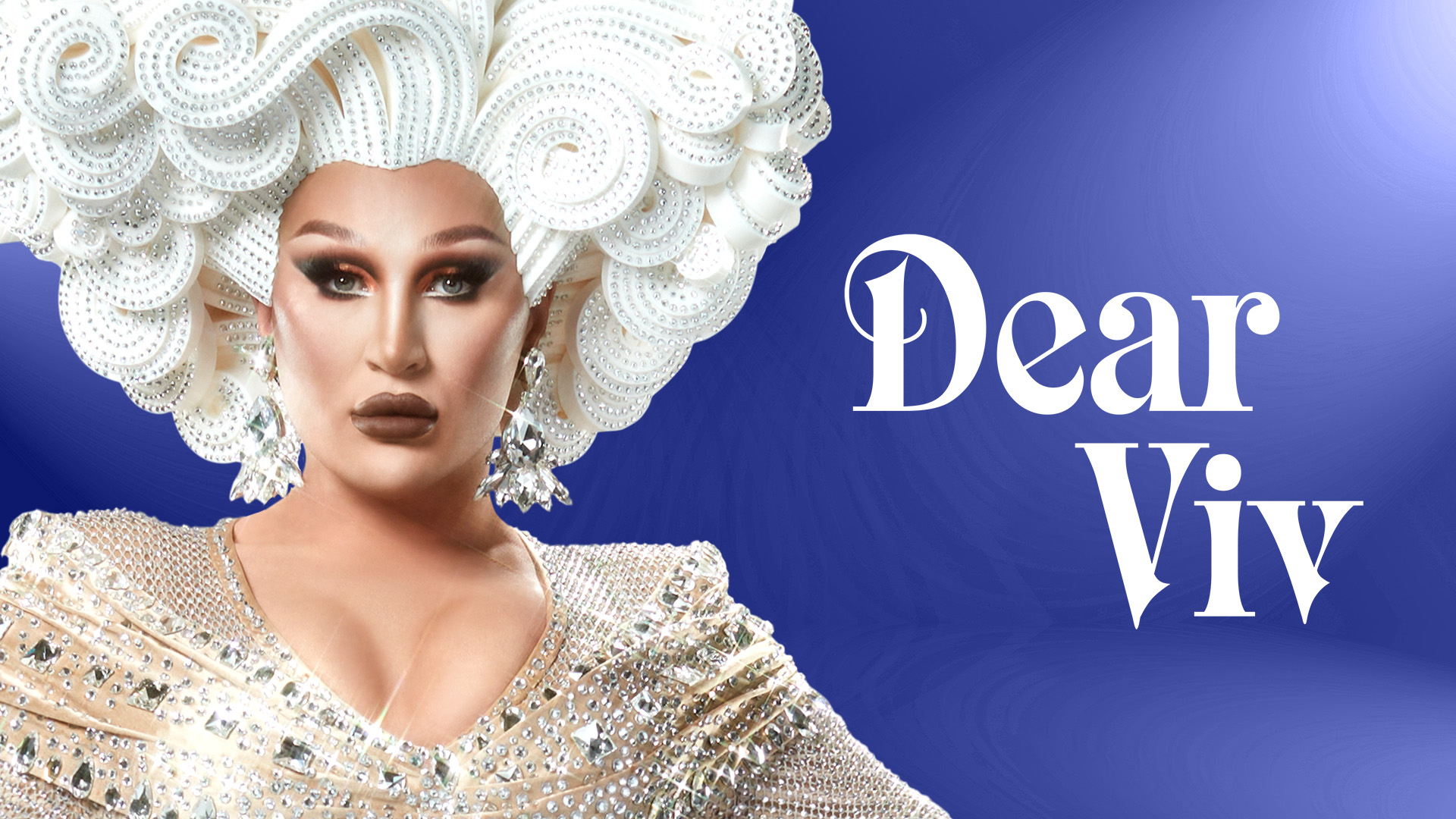
In a year filled with hardships for the LGBTQ+ community, few days have been as collectively devastating as when it was announced that The Vivienne, winner of RuPaul’s Drag Race UK and international superstar, had passed away.
The Vivienne’s impact transcended borders; after winning the inaugural season of Drag Race UK, the Queen broke barriers with her performances in theater and television. In just a few years, she became a mainstay of international queer culture, a rise to stardom that Pete Williams’ documentary Dear Viv does its best to honor.
The doc gathers The Vivienne’s loved ones to speak about her impact on modern culture and how devastating it was to lose such a powerful light in their lives. The feature is a beautiful memorial of a life taken too soon — and it’s also a call-to-action. Because the documentary details how The Vivienne’s struggles with addiction led to her death, it hopes to not only commemorate a legend but raise awareness of the rampant drug abuse that fills the queer community.
The Los Angeles Blade got the chance to sit down with some of the other UK stars featured in the documentary to hear not only what The Vivienne meant to them, but what they hope this legacy can do for thousands of LGBTQ+ individuals today.
“We always knew she was destined to be a star…and just to see her achieve her dreams, it couldn’t have happened to a better person,” said Michael Marouli, runner-up of Drag Race UK season five and long-time friend of The Vivienne. It was a sentiment shared by not only her close friends, but the late performer’s thousands of fans; viewers first met The Vivienne when she strutted onto Drag Race UK season one, marvelling with her talent before eventually winning and becoming the country’s first Drag Superstar. “Everything that she did from her crown onwards, she did it to the utmost excellence,” agreed Cheryl Hole, another series alumni who spoke in the documentary. “From her TV work to her theater runs…I knew the future was just going to be so bright and so full for her.”
And it was a bright future indeed, as The Vivienne’s tenure on Drag Race was followed up with appearances in other hit UK shows, features in multiple popular films, and even a starring role in the West End’s production of The Wizard of Oz. The early portion of Dear Viv highlights these successes and the hard work it took to achieve them, following its central figure as she grew from a teenager performing underage at drag bars to the iconic Queen fans know her as today. It emphasizes how she paved the way for so many other queer celebrities, making it all the more gut-wrenching when viewers remember what is to follow all this success.
Advocates have been speaking up for decades about the disastrous impact hard drugs have on the LGBTQ+ community. Since the 1970s, studies have shown how party-centric venues, being some of the only inclusive spaces, combined with mainstream society’s mistreatment of queer folk, make LGBTQ+ people particularly vulnerable to drug and alcohol addiction. It’s what has led queer communities to have some of the highest rates of drug addiction in the world — yet since this problem has gone largely unaddressed, many of the people facing this addiction are left to deal with these issues in solitude.
Dear Viv not only details the Queen’s multi-year struggle with addiction and the relapse that led to her death, but also how loved ones are using her legacy to save others from fighting their demons alone. The Vivienne’s blood sister, Chanel Williams, is leading the charge; not only has she appeared on numerous talk shows raising awareness around the dangers of ketamine, but she has created the House of The Vivienne, an addiction support group working to combat drug addiction in the UK’s queer community.
“I truly believe what Viv’s family are doing right now is incredible,” said Cheryl Hole, the usually sardonic Queen growing serious when discussing this important advocacy. “[This is] a place where people can come for narcotics, anonymous support, and truly take away the stigma of using drugs.” It’s a goal that has gone worldwide; in the months since The Vivienne’s death advocacy organizations across the U.S. have spotlighted the harmful impact of drug addiction and the role we all play in assisting LGBTQ+ people through recovery. It’s unfortunate that these resources were not available when The Vivienne herself needed them, but it’s why her loved ones are determined to help the countless others they know are struggling through the same fight she did.
Beyond anything else, Dear Viv is a heartwrenching, uplifting memoriam for someone who truly changed LGBTQ+ representation for the better. “Whether she was talking, whether she was performing, whether she was just there visually as a gorgeous presence, you were in safe hands with her,” continued Hole, tearfully describing how it was The Vivienne showing viewers that LGBTQ+ performers were just like them which allowed other UK Queens to achieve similar fame. And when it comes to her struggles with drug abuse and the advocacy her death has spurned on, the Queens echo in interview the documentary’s mission statement: reach out. There is help available even when it seems like there’s not, and people like The Vivienne’s family are fighting to make these resources more visible every single day.
While the entire documentary embodies this message of seeking help, nobody articulates it better than Michael Marouli themself. “I promise you it gets better when you speak to somebody,” said the Queen tearfully as her interview came to a close. “I can imagine how scary it is and how you might feel alone, but once you speak to someone, it does get better — I promise. So please, please, please, if you are struggling, seek the help you need. And there are people out there who are willing to do the work to get you where you need to be beautiful.”
A statement that The Vivienne would be proud of.
a&e features
David Hernandez on sobriety, vulnerability, and the power of music to heal
In honor of National Alcohol and Drug Addiction Recovery Month, American Idol finalist David Hernandez opens up about his own journey from addiction through sobriety and the importance of visibility, vulnerability, and community in the recovery process.

Fans remember David Hernandez as the velvet-voiced finalist who lit up American Idol season 7, but behind the glam of the bright lights is an artist on a deeply personal journey. In this candid convo, Hernandez opens up about sobriety, the healing power of music, and why vulnerability might just be the bravest thing you can wear (aside from sunscreen). With his latest single, “Feel It All,” Hernandez is hitting emotional truths and offering a bit of hope to anyone who’s ever felt like they were singing solo.
September is National Alcohol and Drug Addiction Recovery Awareness Month. What does that mean to you personally, and why is it important to bring public awareness to it?
It means a lot to me as someone who’s in recovery. There’s still a lot of stigma around admitting you have a problem, whether it’s alcoholism or addiction. Vulnerability is difficult because people can weaponize it, and that makes honesty really scary. It takes a lot of bravery and truth to be strong enough to share your story publicly.
I think it’s beautiful that there’s a month dedicated to people living with this affliction. It gives us visibility, and it gives others, who may not understand addiction, the chance to learn more. Awareness fosters empathy, and empathy leads to change.
Your single “Feel It All” explores themes of emotional pain and self-reclamation. How has acceptance played a role in your healing?
When you live in your truth and authenticity, you finally give yourself space to process and unpack trauma, whether it’s childhood, young adult, or current-day trauma. And there’s a lot of it just from existing in the world.
The hardest part is often being honest with yourself. We’re conditioned to push things down so we can hustle, present well, and avoid vulnerability. But being honest, with yourself first, starts the healing process. That honesty is the crux of recovery.
For me, it’s not just about being in recovery, but about being a man who came from a single-parent household, with addiction in the family and a lot of unhealed wounds. When I started owning my story, I stopped relying on unhealthy coping mechanisms, like alcohol, drugs, sex, sugar, or even external validation. Now, I’m learning how to cope in a healthy, sustainable way.
You originally created “Feel It All” as a form of personal therapy. What made you decide to release it publicly?
Honestly, I still go back and forth, even now I’m like, “Should I be saying all this?” As an artist, there’s always some level of doubt.
But like Nina Simone said, “It’s the artist’s duty to reflect the times.” That includes our internal worlds too. If I’m feeling something deeply, chances are, thousands, if not millions, of others are feeling it too.
The song started on a treadmill, literally. I was at the gym and began writing melodies in my head. I called my friend Trump Park, who produced my last album Don’t @ Me (2022), and invited him over. Normally, we’d open a bottle of tequila while working, but this time, we drank soda water with lime and just vibed.
I didn’t intend to release it. But when I played it for a few people and saw them crying—not because they were sad for me, but because they related, I realized it wasn’t just about me. It was healing me, and maybe it could help heal someone else too.
That’s the beauty of authenticity; it resonates. “Feel It All” isn’t sugar-coated. The first verse asks, “Who am I without the substances?” It’s honest and raw. And I hope it reaches someone, maybe a young kid in Middle America who doesn’t have the resources or the representation I lacked growing up.
Speaking of representation, the music video embraces themes of vulnerability and community. Why was it important to include that visually, and how has community shaped your own recovery?
Community has been everything for me. Growing up biracial, half Mexican, half white, I often felt like I was straddling two worlds. I also knew I was gay from a young age, and I didn’t see anyone in the media who looked, acted, or felt like me. There wasn’t representation for people like me, biracial, queer, artistic, emotional.
The video includes drag nuns from the Sisters of Perpetual Indulgence, who work to de-stigmatize religion in the LGBTQ+ community, especially for those of us with religious trauma. It also features people from different backgrounds, ages, identities, and inferred traumas. It was important to me to reflect the diversity of recovery and the shared humanity underneath it all.
Representation matters. It allows people to feel seen, which makes healing possible. We’re wired for connection. What better way to connect than to recognize that our similarities far outweigh our differences?
What’s one common misconception about sobriety or recovery you’d like to clear up?
That it’s a choice. It’s not.
Addiction is a disease. I’ve seen incredibly successful people with full lives succumb to it, not because they didn’t love their lives, but because the disease doesn’t discriminate.
People often say, “Why can’t they just stop?” If it were that easy, everyone would stop. But it’s not about willpower, it’s about mental illness, trauma, and brain chemistry. It requires treatment, support, compassion, and community.
You mentioned relapse. What would you say to someone who just relapsed yesterday and is struggling with shame?
I’d say: There is always a seat for you at the table of recovery.
Relapse doesn’t make you a failure. It’s part of the journey for many of us, including me. Shame isolates you, and isolation is what the disease wants, it wants you to stay silent and spiral.
Reach out to someone in the sober community and tell the truth: “I used again, and I need help.” That’s it. Let someone guide you to the next step, whether it’s a meeting or a conversation. Time isn’t a tool—whether it’s 10 days or 10 years, recovery is about today. Focus on this moment.
What are some daily practices that keep you grounded?
I start my day with the Serenity Prayer, sometimes five times a day. I get gratitude lists from sober friends and try to write my own when I can. I talk to my sponsor regularly, check in with others, and ask how they’re doing, because focusing on someone else helps me get out of my own head.
I exercise, lots of cardio and hiking. I cook. I have a skincare routine that’s like a ritual at night. I keep to-do lists with Sharpie markers, it helps keep my thoughts from running wild.
These are small things, but they’re meaningful. And when I stay grounded in routine, I stay further away from the chaos.
How has your music evolved throughout your sobriety journey?
I used to rely on a drink before studio sessions or performances, to calm my nerves. Now, I lean on meditation, prayer, and letting myself feel uncomfortable until the feeling passes. And guess what? I don’t die from it.
My relationship with music has deepened. I’m more intentional. I finish songs faster. I record at home. I feel more connected to the process, to the source. I think my higher power shows up in my creativity now.
That said, I still love my past catalog, it represents different parts of me. But now, I’m learning how to channel something more grounded, more real. And I think that shows in the music.
Do you see “Feel It All” as part of a larger project, or more of a standalone release?
Right now, I’m just letting it live and breathe. But next year is the 10-year anniversary of my single “Beautiful,” and we’re doing a remix with a special guest artist. “Feel It All” and “Beautiful” both promote healing and inclusivity, so they’d absolutely belong on the same album. Whether or not there’s a full project, they’re part of the same emotional journey.
What would you say to fans who are struggling with addiction but don’t yet see a way out?
There is a way out. It starts with honesty, with yourself and with someone you trust.
Help is available. At the end of the “Feel It All” music video, we list organizations that can offer support. Even if they can’t help directly, they can point you in the right direction. You’re not alone. You just have to take that first brave step and say, “I think I need help.”
If fans only remember one lyric from “Feel It All,” which would you want it to be?
The second verse:
“I don’t need someone to judge my past,
But the way I’m living just can’t last.
I’m tired of lying, to end up in a place where I’m dying.”
That lyric captures the pain and urgency of knowing you’re in trouble, but also the hope that comes from admitting it.
Another part says:
“And if I’m being honest with myself,
I’ve been doing things that ain’t good for my health.”
That line isn’t just about drugs or alcohol—it’s about everything we use to numb: sex, binge eating, validation. Anything for a quick dopamine hit. But none of that heals us.
Can you name a few of the support organizations listed in the video that fans can turn to?
Absolutely. Here are a few:
988 Suicide & Crisis Lifeline – Call or text 988
West Hollywood Recovery Center
And honestly, people can reach out to me. I’m happy to connect them with resources.
Check out the full video:
Movies
Hidden queer stories invoked in ‘History of Sound’
Poignant, buzzy film reveals hardships and sorrows, hopes and dreams
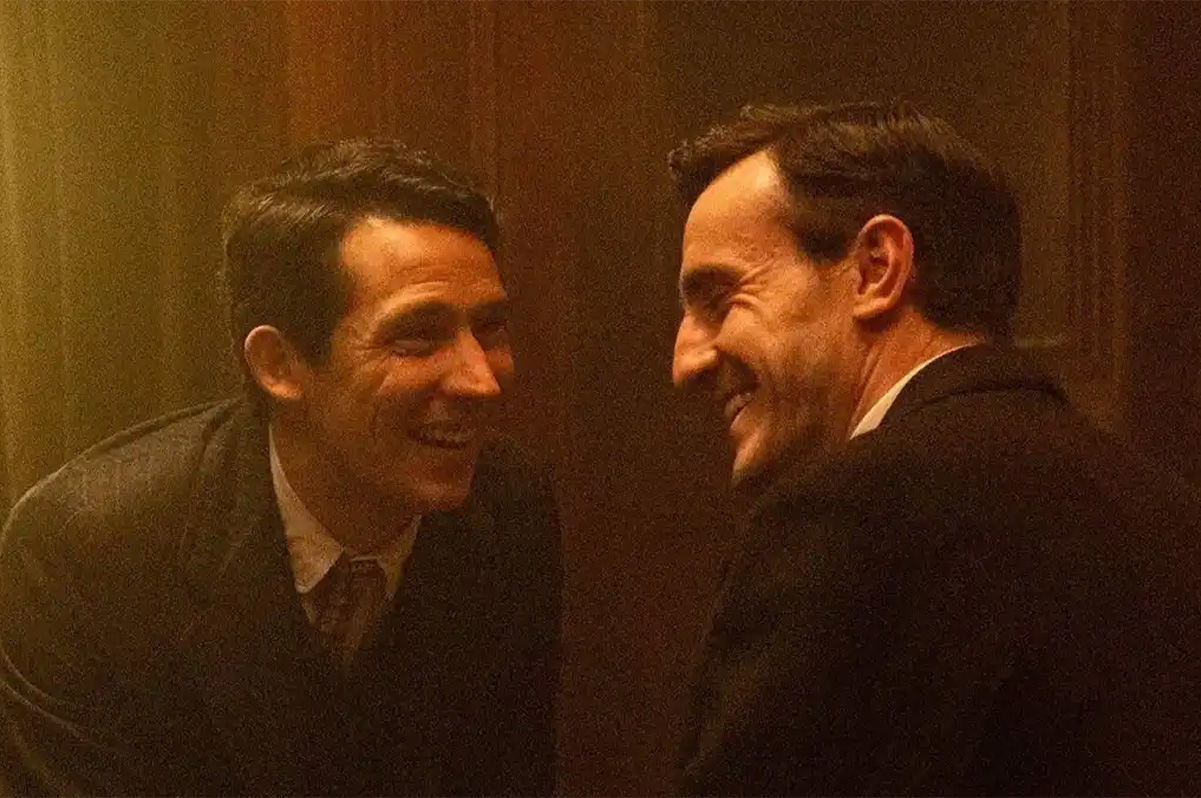
To most of us today, folk music is just another genre. We might have some general knowledge that it originated as rustic traditional songs handed down across generations, but few of us likely think much about it beyond that.
If we did, we might recognize how much human experience, with all its joys and sorrows, was wrapped inside those traditional tunes, and how many private emotions are refracted in them through each link in the human chain that passes them down – and that is what “The History of Sound” (Oliver Hermanus’ new film, starring Paul Mescal and Josh O’Connor) tries to convey. It’s an esoteric idea, to be sure, but the South African director (whose film “Beauty,” won the Queer Palm at Cannes in 2011) has a sophisticated cinematic vocabulary capable of getting it across, and it certainly helps that he uses a sexy and passionate queer love story as the vehicle to take us there.
Set in the years around World War I, it’s the story of Lionel (Mescal) and David (O’Connor), two music students who meet at college in 1917; Lionel comes from humble origins in the farmlands of Maine before, while David is a young man of status and means, yet it’s as close to love at first sight as you can get. They strike a spark together that only grows brighter as their passion for music bonds them deeper. Of course, it’s 1917, and history is about to get in the way. War is declared, the college is closed, and David is called to active service in Europe, while Lionel returns home to a farm that’s declining along with his family’s already meager fortunes.
After the war, David returns, world-weary from his time in the trenches but eager to get back to his musical studies – and to Lionel, whom he asks to accompany him on a trip through rural Maine to collect local folk songs by recording them on wax cylinders for study and for posterity. Their journey together is idyllic; they connect deeply with the music – and the people – they encounter and record along the way, and embrace their love for each other without reservation. When it ends, however, they go their separate ways.
From there, the story leaps ahead, following Lionel as his academic career takes him to Europe and a life he never dreamt of – all the while haunted by memories of David. Eventually, fate provides a thread that might bring them together once more – leading him to hidden secrets that cast a whole new light on their love for each other, and that add yet another layer of personal meaning to the folk songs that once brought them together.
It would be easy to play up the sex appeal of the lead couple Hermanus scored to enact his heartfelt opus about love, music, and an eternal thread of shared human experience – indeed, the press around this buzzy movie, which was a favorite at this year’s Cannes festival (where it was nominated for the Queer Palm), has focused most of its attention on the chemistry between its two “It-Boy” stars, neither of whom publicly identifies as queer but who have both established themselves firmly as dedicated to the authentic portrayal of queer experience.
That chemistry, unsurprisingly, is epic. Mescal, whose irresistibly masculine appeal is deepened by the vulnerable sensitivity he brings to his characters, both here and in previous films (such as the haunting “All of Us Strangers”), melts our hearts and wins our respect with a performance that feels almost sacred in its stubborn refusal to abandon queer hope; O’Connor, who so searingly welded us to his struggle over homophobic self-loathing in “God’s Own Country” long before his stint as Prince Charles on “The Crown” or his bisexual-teasing turn in “Challengers,” provides a tantalizingly opaque portrait of “prudently” compliant queer identity, coupled with an implied-but-essential element of “don’t ask, don’t tell” which lends the whole thing a tragic air of compromised resignation. Yet the combination somehow evokes our own deepest fantasies, our true-romance daydreams of finding a queer “eye of the hurricane” in which it is possible to live our truth, shielded from the strictures imposed by the larger society.
Inevitably, there are comparisons to be made with “Brokeback Mountain,” the quintessential tragic gay love story that shares its contrast of pastoral bliss and societal obligation and mirrors the star-crossed romance which drives it; and while we’ll be the first to say that we wish we no longer had to see bittersweet onscreen queer love thwarted by tragedy, timing, and social convention, we can’t deny that it’s important to be reminded of the reality that has made that trope so eternally relevant – especially in a time when any advances we may have made toward living an open life have been critically endangered by a political climate that seems bent on rolling us all back into the closet,
In any case, it hardly matters. “The History of Sound” might move a bit too slowly for some tastes, or indulge in its fascination with music a little too deeply to suit those who are just there for the love story, but it ultimately succeeds in making us identify with its lovers’ boldness to embrace their lives fully, and the sanctuary they provide for each other behind the camouflage they must maintain in the larger world. It’s the tightrope of living in a homophobic society, rendered vividly in Hermanus’ leisurely-paced, deeply compassionate, and utterly heart-stirring period narrative – adapted for the screen by Ben Shattuck, from two of his own short stories – and left in our laps to contemplate as the final credits roll.
What elevates it beyond that bittersweet validation of queer love, in all its devastating cultural inconvenience, is its profoundly felt embrace of music as an ongoing record of human existence; “The History of Sound” is also a history of hardships and sorrows, of hopes and dreams and inspirations, and by invoking that continuous thread of lived experience, binds it to the long-obscured reality of queer love that has always existed outside the margins, reminding us that we’ve always been part of an ongoing story that is still being written today.
In all its candid melancholy, it reminds us that we are and have always been a part of the whole, despite the objections of small minds and societal acceptance, and that’s more than enough to justify all the industry buzz that precedes it.
And if you need more encouragement to see it, that spitting scene is pretty hot, too.
a&e features
C’mon, Dallas! Wesley Smoot brings Unleashed LGBTQ+ queer business conference & festival to the Lone Star State
Unleashed LGBTQ+ creator Wesley Smoot spills the (sweet) tea on organizing a queer cultural movement deep in the heart of Texas.
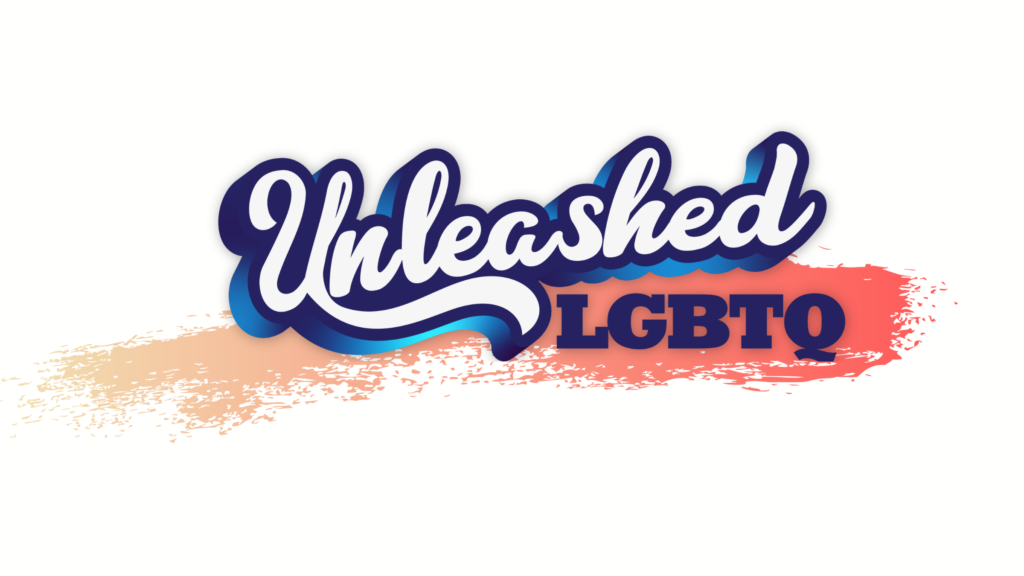
The Los Angeles Blade is trading palm trees for cowboy boots as Publisher Alexander Rodriguez heads deep into the heart of Texas for Unleashed LGBTQ+, Dallas’s unapologetically queer answer to your typical business and entertainment conference (queue Chappell Roan’s Pink Pony Club dance remix). Founded by the ever-hustling and ever-bustling Wesley Smoot, Unleashed is where LGBTQ+ thought leaders, disruptors, celebs, and creatives kiki and coalesce to mix strategy with sass, all while redefining what it means to lead and live ever-loud and ever-proud in today’s rather regressive social climate. At a time when queerness is still being legislated, debated, and silenced, Unleashed LGBTQ+ is jacking up the volume full blast. And the Blade is here and queer for it. Let’s get a little unleashed with Wesley Smoot.
Unleashed is quite the queer powerhouse. What was the moment or impetus that birthed the idea to create Unleashed LGBTQ?
I saw so many impressive queer artists and entrepreneurs doing amazing work, and I felt that if there was a platform to amplify all their latest projects, how impactful that would be. It was around 2019, and I was writing a review about a vodka brand, and it hit me – let’s work to feature all these people in one place. We can learn about these projects, products, and ideas, and attendees can connect with one another at the same time.
How does Unleashed challenge the narrative of what it means to be queer in Texas, especially in a city like Dallas, which has such a unique queer history?
Dallas really does have a history! And I think it’s great to pull people in to see what a vibrant queer history that is. Places like S4 and Round Up Saloon have been around forever! As for Unleashed, many of the people coming into Dallas for the event are not aware that it has the sixth-largest LGBTQ+ population in the nation. When they see the scene, they’re often surprised. When they hear a lot of our stories, I think they’re surprised but also inspired.
You’ve made yourself quite committed to championing underserved communities. How do you incorporate that passion into Unleashed’s programming and partnerships?
We aim to host discussions about things we feel are relevant. I think this can be tough because when it comes to equality, some of these conversations can be depressing. No less, there are issues we need to address and conversations we need to have. Discussions about marketing, media, culture, and entertainment can be educational and entertaining. We always make sure to include non-profit organizations like HRC and The Trevor Project.
Unleashed was created as a virtual event during the pandemic, then became an in-person festival in Dallas in September 2023. What lessons did you learn from that virtual-to-live transition?
I had more experience with live events. I actually had to teach myself how to run the back-end of a virtual event – this was a very intense crash course. Learning many new skills in a very short amount of time was difficult, but it’s funny how much confidence that can give you moving forward. I do think that starting with virtual gave me a much clearer idea of how I wanted to format the programming.
Half of 2025 ticket revenue is going to the Human Rights Campaign. What motivated this charitable move?
I have always admired the work HRC does. But really, I think when people see that there is a fun, cool event that is benefiting a cause that they believe in, it makes it a lot easier to get their attention and motivate them to join us for a fabulous event.
As we touched on, the Dallas–Fort Worth area has a strong LGBTQ+ history, with roots dating back to early pride parades and growing grassroots activism. How does Unleashed add to or impact the local Queer community and scene?
I think we add to it by sparking conversations on live stages through panel discussions. Some of those conversations have a lot to do with LGBTQ+ history, non-profits and the impactful work they do, queer artists and the new projects they want to promote. We bring a lot of these people together, whether local or flying them in or getting the locals involved. Dallas has so many heavy-hitters in the non-profit and entertainment sectors.
Unleashed combines business networking, entertainment, advocacy, and culturally relevant brand activations. Why is it important to have this intersectional space, especially in today’s intense political climate?
I think it’s important to talk about how this political climate is affecting us all, even if we are in different industries. LGBTQ+ is the common thread at Unleashed, and when attendees connect at our events, they can see and share their experiences with each other. I know a lot of people have found business opportunities at Unleashed, but also support systems.
Queer folks in the South have always had a different kind of resilience. How does Unleashed highlight the Southern queer spirit that often gets overlooked?
I feel like there has been some representation in the media to show the rest of the world about the gay South when you look at Drag Race, True Blood, and other television programs, but I would love to see more. So much of that resilience comes from queer folks who grew up in small towns and had to deal with bullies, their parents’ expectations, or the church. Those experiences stay with us forever. They contribute to making us who we are, for better or worse. I like to think the events we host have plenty of that southern flavor. It’s more important than ever to feel that we have a safe space.
Texas has not always been seen as the most welcoming place for LGBTQ+ folks and yet here we are, throwing a super queer extravaganza in the heart of it. What does that say about where we are as a culture and where we are headed?
That’s a tough one. I got chewed out in the comments section on Linkedin, someone telling me: “How dare you throw this event in Texas with everything going on there?!!” I replied, “Because of everything going on, it’s more important now than ever to host these events in Texas, or Florida, or anywhere else that people may need a safe place to get together and connect.”
I live in Texas. Should I plan an event of this size in a place I don’t live? Seems counterproductive to me, but we are very proud to host this in Texas. I have met people from all over Texas and the surrounding states. Since we do so much with entertainment, it is great to see the people who come in from New York and LA as well. I hope Unleashed LGBTQ+ can continue to grow as an event and as an organization, and I hope the tolerance and acceptance in the Lone Star State continue to grow with us. We’re not going anywhere.
The Los Angeles Blade will be on site for Unleashed LGBTQ SEPTEMBER 19-21, 2025 | DALLAS, TX Get your tickets here
-
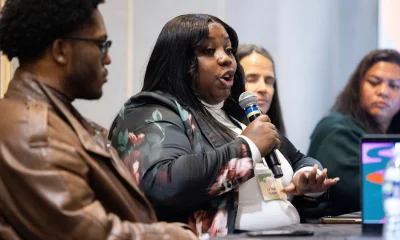
 Los Angeles County5 days ago
Los Angeles County5 days agoNew direct cash program aims to prevent youth homelessness in Los Angeles County
-
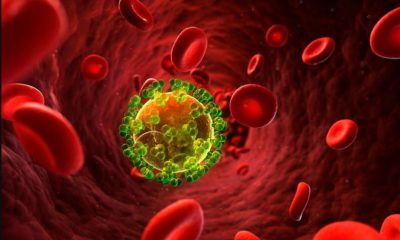
 Commentary4 days ago
Commentary4 days agoPrEPARING California for the future and better supporting those living with HIV
-
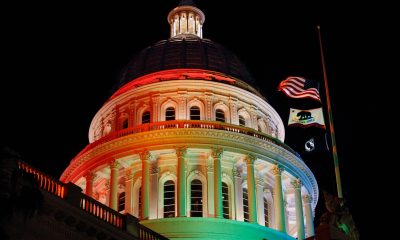
 California3 days ago
California3 days agoCongress members, public health organizations urge Governor Newsom to sign bill amidst threats to PrEP access
-
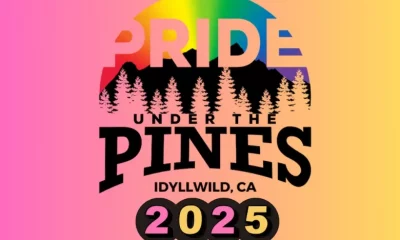
 Arts & Entertainment2 days ago
Arts & Entertainment2 days agoPride Under the Pines in Idyllwild continues for its 5th year, despite social media backlash
-
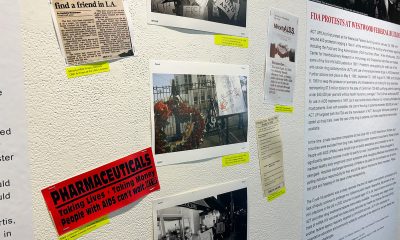
 Arts & Entertainment2 days ago
Arts & Entertainment2 days agoNew exhibition unveils archival records and forgotten stories of HIV/AIDS activists
-
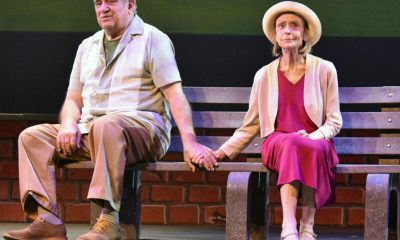
 Theater3 days ago
Theater3 days ago‘Just Another Day’ brings two veteran actors together for a bittersweet reflection on life: Theatre Review
-
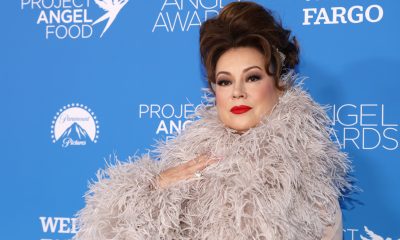
 a&e features1 day ago
a&e features1 day agoJennifer Tilly on the legacy of queer neo-noir ‘Bound’ nearly 30 years later: “It was considered detrimental to your career to play a lesbian character”
-
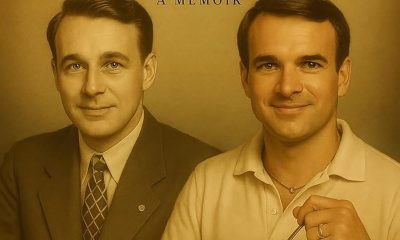
 Books22 hours ago
Books22 hours agoRichard E. Cytowic explores complicated relationship with father in new book

